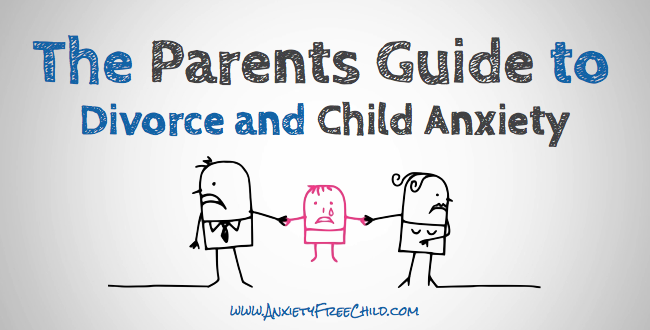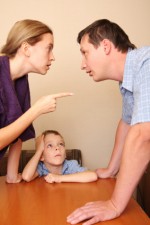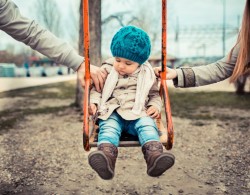 Common sense says a parent’s divorce has a huge impact on a child, but the extent and severity of that impact on a child’s anxiety may surprise you. Divorce tears a family apart on the literal level, introducing a new way of life, a new family dynamic and maybe even a new place to live.
Common sense says a parent’s divorce has a huge impact on a child, but the extent and severity of that impact on a child’s anxiety may surprise you. Divorce tears a family apart on the literal level, introducing a new way of life, a new family dynamic and maybe even a new place to live.
Divorce also has a field day on the psychological level, with the tendency to:
- Increase dependence in younger children, leading to regressive behaviors
- Speed up independence in adolescents, leading to rebellious behaviors
- Negatively impact a child’s school and social performance
- Split a child’s world into two separate lives
All this, as you may have guessed, increases a child’s anxiety. Children with existing anxiety issues or disorders may suffer from even higher levels of anxiety. For other children, anxiety issues and disorders can erupt where none previously existed. In either case, the results are not pretty.
Anxious Children and Regression
Anxiety can especially hit an all-time high for children who react to divorce with increased dependence, according to Psychology Today writer and psychologist Carl Pickhardt. Fear fuels anxiety, and children may begin to fear the worst when it comes to future developments that may never even happen.
 “So much is different, new, unpredictable, and unknown that life becomes filled with scary questions,” Pickhardt explains.
“So much is different, new, unpredictable, and unknown that life becomes filled with scary questions,” Pickhardt explains.
- Where will I live?
- Who is going to take care of me?
- Will I ever see my dad (or mom) again?
- What if something happens to the parent I’m living with?
- If my parents no longer love each other, will they also stop loving me?
You get the idea.
As their minds play out the worst-case scenarios, anxiety levels soar and children may begin to sink lower into a pit of terror as they regress into more dependent behaviors. Bed-wetting, tantrums, separation anxiety, inability to do basic tasks they used to do independently, refusing to go to bed or whining and weeping at bedtime are just a few examples Pickhardt offers.
The regression into earlier childhood behaviors can be a tactic that gets parents to pay more attention to the child. Or it can be an attempt for the child to bring the parents back together over a common concern: the welfare of their child.
Anxious Children and Rebellion
While the younger child may be reverting to sucking her thumb or wetting his bed, the older child may start acting out with anger and disregard for his or her parents. Their mind may be plagued with thoughts such as:
- I’ll have to take care of myself, since my parents obviously can’t do it.
- Why should I follow their rules when they can’t even keep up the rules of marriage?
- They didn’t care about my feelings about their divorce, so I’ll just have to take care of my own feelings and do what makes me happy.
You get the idea, here, too.
“Where the child may have tried to get parents back, the adolescent may try to get back at parents,” Pickhardt writes. “Where the child felt grief, the adolescence has a grievance.”
Welcome to the post-divorce aftermath.
Divorce’s Long-Term Impact on Anxious Children
 Kids aren’t in the clear once the divorce is final, either. They can be plagued with emotional and academic difficulties for months, or even years, following a divorce. A study published in American Sociological Review found that children of divorce suffered from anxiety, depression, poor social skills and poor math skills for a minimum of two years following the split.
Kids aren’t in the clear once the divorce is final, either. They can be plagued with emotional and academic difficulties for months, or even years, following a divorce. A study published in American Sociological Review found that children of divorce suffered from anxiety, depression, poor social skills and poor math skills for a minimum of two years following the split.
Study results showed the detrimental affects hit children hard the moment the divorce proceedings began. Those effects kept children of divorce behind the class average in math and social skills. The children also began to exhibit behavior problems, but not always in the form of acting out rebelliously or defiantly. They instead internalized the behavior problems, resulting in emotional turmoil that included loneliness, depression, sadness and, as you may have guessed, yet more anxiety.
Another notable finding that came out of the study was the timing of the detrimental effects. Although children began to suffer on multiple levels as soon as official divorce proceedings kicked off, their social and academic performance was not impacted prior to the official filing.
One theory was that not all households with dying marriages necessarily contain the arguments, tension and grief that come from a pending divorce. Another theory says that parents with children who already suffer from anxiety, depression or are otherwise highly sensitive may choose to stay together “for the sake of the child.”
This would have exempted those children from the study, which exclusively looked at divorced, single-parent households. Just because those particular children didn’t make it into the study, however, does not mean they are not suffering.
The Split Life
 Divorce can contribute to child anxiety by forcing children to live in two different worlds, often with two distinct personas they may not ever realize they are creating. Perhaps mom is privy to the studious, serious persona while dad, who gets weekend visits, ends up with the happy-go-lucky, adventurous one.
Divorce can contribute to child anxiety by forcing children to live in two different worlds, often with two distinct personas they may not ever realize they are creating. Perhaps mom is privy to the studious, serious persona while dad, who gets weekend visits, ends up with the happy-go-lucky, adventurous one.
“(Children) report that they feel like different people with each of their parents, that their parents are polar opposites (even when they’re not), that they need to keep more secrets from their parents than other kids do, and that they don’t want to resemble one of their parents too much, because it might alienate them from the other parent,” according to the book Between Two Worlds: The Inner Lives of Children of Divorce.
Children may subconsciously be working on fitting the persona they believe each parent wants or needs. Even at the subconscious level, such action takes a lot of energy and creates a lot of stress. The child may end up with dramatic mood shifts, walking on air one minute and darker than a raincloud the next. Psychology Today writer Ilana Simons additionally points out children may start blaming themselves for these mood shifts, as if they are doing something wrong to create them.
One more layer of stress from this set-up can come from the code of ethics or rules to live by that children may feel they have to establish for themselves. Adapting a moral code from one household may go against the other household, the child may think, so they are left to create their own moral code at a very early age. And that moral code may be quite lacking.
Tips for Parents
Your main concern as a parent of an anxious child going through divorce is to retain some type of structure. Pickhardt advises paying close attention to the “Three Rs”:
Routines: Usual routines provide predictability, establish order and contribute to security. Whether it’s going to bed every night at 8 p.m. or visiting dad every Wednesday, routines help children know what to expect.
Rituals: Family rituals can keep familiar activities close to the heart and offer a sense of safety. Help children create their own rituals so they enjoy a sense of control in their personal lives.
Reassurance: Tell your child you love him or her and will always love him or her, no matter what. You will also do your best to find a way for this new way of life to work out.
Another important aspect is that you be there for your child, even if it’s just to listen. Anxious children will have a laundry list of worries and woes, and simply letting them share them can be a huge relief for your child. Don’t think you have to have all the answers, or even any immediate answers, sometimes just listening is enough.
SOURCES:
- http://www.livescience.com/14402-divorce-plagues-kids-social-academic.html
- http://www.psychologytoday.com/blog/the-literary-mind/200907/children-divorce-are-good-actors
- http://www.psychologytoday.com/blog/surviving-your-childs-adolescence/201112/the-impact-divorce-young-children-and-adolescents
- http://www.helpguide.org/mental/children_divorce.htm





